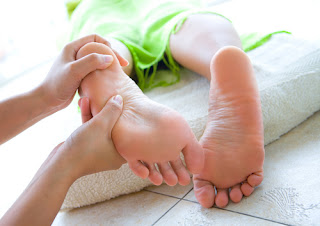Reflexology careers have been gaining in popularity for the past 25 years and continue to grow today. With the current wellness boom in th...
Today, practitioners of reflexology have the opportunity to make this rewarding field their full-time career. They may run private practices in their own homes, travel to client homes or work in chiropractic offices, fitness centers or salons where they deliver treatment and work on building a solid client base.
Reflexology Education
If a reflexology career interests you, finding the right reflexology school can make all the difference to your success. A reflexology program should provide not only the technical training you will need to do the job, but also fundamental business concepts and other essential aspects of the profession.
Your reflexology course work should cover the following subjects:
Reflexology history, theory and techniques
Reflexology maps of the feet
Anatomy and physiology
How to customize sessions based on client-specific issues
Ethics and professionalism
Relevant business practices and marketing
Supervised classroom or clinical work
Reflexology School Tuition and Length of Study
Reflexology school programs generally take between six and twelve months to complete and involve 150 to 300 hours of study combined with hands-on practice. Some schools offer online as well as traditional classroom programs to meet course work requirements.
You can expect tuition for a reflexology education program to cost approximately $1,500 to $3,500. As part of your education, you will also need to purchase a massage table or reclining chair, which typically costs $200 to $500.
Reflexology Certification
Certification requirements for reflexologists vary from state to state. Many reflexology school programs result in reflexology certification that meets state requirements; however, others may deliver a diploma without certification.
You will need to research the laws for the state where you plan to practice to ensure that you make the best choice in a reflexology school program. The Reflexology Association of America (RAA) provides a summary of state laws that can help guide your search. Also talk to advisors at your schools of interest for more information.
The American Reflexology Certification Board offers national certification to candidates who meet requirements for education and hands-on practice and pass a certification exam. To maintain your certification, you must pay a renewal fee every year and complete continuing education units every two years.
Reflexologist Salary
You can expect reflexology salaries to correspond closely to massage therapist salaries in the area where you plan to practice. Of course, the field offers a lot of scheduling flexibility, and the number of hours you work per week will impact your income. Salaries will also vary based on your geographic location, employer type and experience level.
According to Medical-Career-Training.com, reflexologists earn an average annual salary of $30,000. Salary.com indicates that reflexologists typically charge between $40 and $80 per one-hour session, with 90-minute sessions ranging from $60 to $110.
Self-employed practitioners keep the entire amount they earn per session, but must pay their own taxes and expenses. However, those employed at a spa, fitness center or other establishments typically earn a percentage of the session cost, plus tips.
Reflexology offers clients a non-invasive, integrative healing alternative to traditional medicine. Starting your reflexology career with the right education and credentials will help you build a foundation for long-term success in this expanding natural health field.
Here are some Reflexology Pictures (click to view)
 |
 |
 |
 |
 |
 |
 |
 |
Reference: naturalhealers.com








No comments